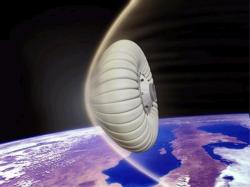

(New Scientist Space) [I]n the last few decades, engineers have toyed with the idea of flexible, lightweight heat shields. Because they would weigh less than conventional solid shields, the weight they save could be used to carry more science instruments or other gear.
Ballutes, which use pressurised gas to inflate cushions on the bottom of their payloads before entering the atmosphere, could also slow the payloads down for a soft landing. Robotic missions to Mars have dipped into the upper reaches of the planet's atmosphere to slow down and circularise their orbits. A ballute would provide even greater surface area, increasing the atmospheric drag and maximising this "aerobraking" effect.
Although engineers have to work out a few kinks in the system (as to insuring that the ballute inflates) this technology may be quite useful and help decrease the overall expense of rockets (at least by a little).
Note: LiftPort may also want to consider this as part of their space elevator design, as insurance just in case a climber (full of people or cargo) breaks off from the tether.
Want more space geek news? Then subscribe below via email, RSS or twitter for free updates! Prefer another service? How about via RSS or follow Colony Worlds on Twitter!




![ColonyWorlds[at]Gmail[dot]com](http://img.photobucket.com/albums/v438/hiddennook/ColonyWorlds.png)







Duly noted - and fascinating technology.
ReplyDelete